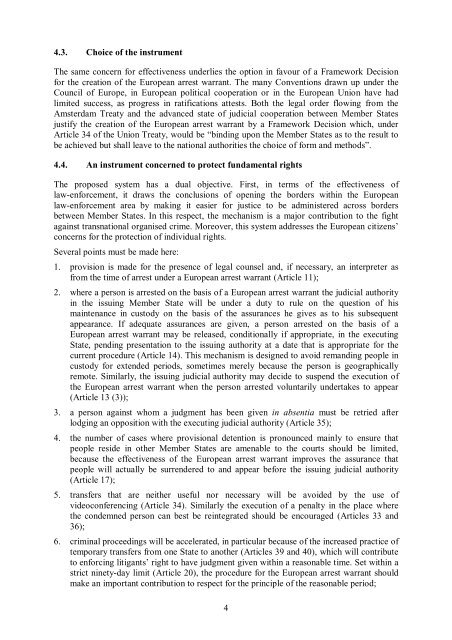the European arrest warrant - Statewatch
the European arrest warrant - Statewatch
the European arrest warrant - Statewatch
You also want an ePaper? Increase the reach of your titles
YUMPU automatically turns print PDFs into web optimized ePapers that Google loves.
4.3. Choice of <strong>the</strong> instrument<br />
The same concern for effectiveness underlies <strong>the</strong> option in favour of a Framework Decision<br />
for <strong>the</strong> creation of <strong>the</strong> <strong>European</strong> <strong>arrest</strong> <strong>warrant</strong>. The many Conventions drawn up under <strong>the</strong><br />
Council of Europe, in <strong>European</strong> political cooperation or in <strong>the</strong> <strong>European</strong> Union have had<br />
limited success, as progress in ratifications attests. Both <strong>the</strong> legal order flowing from <strong>the</strong><br />
Amsterdam Treaty and <strong>the</strong> advanced state of judicial cooperation between Member States<br />
justify <strong>the</strong> creation of <strong>the</strong> <strong>European</strong> <strong>arrest</strong> <strong>warrant</strong> by a Framework Decision which, under<br />
Article 34 of <strong>the</strong> Union Treaty, would be “binding upon <strong>the</strong> Member States as to <strong>the</strong> result to<br />
be achieved but shall leave to <strong>the</strong> national authorities <strong>the</strong> choice of form and methods”.<br />
4.4. An instrument concerned to protect fundamental rights<br />
The proposed system has a dual objective. First, in terms of <strong>the</strong> effectiveness of<br />
law-enforcement, it draws <strong>the</strong> conclusions of opening <strong>the</strong> borders within <strong>the</strong> <strong>European</strong><br />
law-enforcement area by making it easier for justice to be administered across borders<br />
between Member States. In this respect, <strong>the</strong> mechanism is a major contribution to <strong>the</strong> fight<br />
against transnational organised crime. Moreover, this system addresses <strong>the</strong> <strong>European</strong> citizens’<br />
concerns for <strong>the</strong> protection of individual rights.<br />
Several points must be made here:<br />
1. provision is made for <strong>the</strong> presence of legal counsel and, if necessary, an interpreter as<br />
from <strong>the</strong> time of <strong>arrest</strong> under a <strong>European</strong> <strong>arrest</strong> <strong>warrant</strong> (Article 11);<br />
2. where a person is <strong>arrest</strong>ed on <strong>the</strong> basis of a <strong>European</strong> <strong>arrest</strong> <strong>warrant</strong> <strong>the</strong> judicial authority<br />
in <strong>the</strong> issuing Member State will be under a duty to rule on <strong>the</strong> question of his<br />
maintenance in custody on <strong>the</strong> basis of <strong>the</strong> assurances he gives as to his subsequent<br />
appearance. If adequate assurances are given, a person <strong>arrest</strong>ed on <strong>the</strong> basis of a<br />
<strong>European</strong> <strong>arrest</strong> <strong>warrant</strong> may be released, conditionally if appropriate, in <strong>the</strong> executing<br />
State, pending presentation to <strong>the</strong> issuing authority at a date that is appropriate for <strong>the</strong><br />
current procedure (Article 14). This mechanism is designed to avoid remanding people in<br />
custody for extended periods, sometimes merely because <strong>the</strong> person is geographically<br />
remote. Similarly, <strong>the</strong> issuing judicial authority may decide to suspend <strong>the</strong> execution of<br />
<strong>the</strong> <strong>European</strong> <strong>arrest</strong> <strong>warrant</strong> when <strong>the</strong> person <strong>arrest</strong>ed voluntarily undertakes to appear<br />
(Article 13 (3));<br />
3. a person against whom a judgment has been given in absentia must be retried after<br />
lodging an opposition with <strong>the</strong> executing judicial authority (Article 35);<br />
4. <strong>the</strong> number of cases where provisional detention is pronounced mainly to ensure that<br />
people reside in o<strong>the</strong>r Member States are amenable to <strong>the</strong> courts should be limited,<br />
because <strong>the</strong> effectiveness of <strong>the</strong> <strong>European</strong> <strong>arrest</strong> <strong>warrant</strong> improves <strong>the</strong> assurance that<br />
people will actually be surrendered to and appear before <strong>the</strong> issuing judicial authority<br />
(Article 17);<br />
5. transfers that are nei<strong>the</strong>r useful nor necessary will be avoided by <strong>the</strong> use of<br />
videoconferencing (Article 34). Similarly <strong>the</strong> execution of a penalty in <strong>the</strong> place where<br />
<strong>the</strong> condemned person can best be reintegrated should be encouraged (Articles 33 and<br />
36);<br />
6. criminal proceedings will be accelerated, in particular because of <strong>the</strong> increased practice of<br />
temporary transfers from one State to ano<strong>the</strong>r (Articles 39 and 40), which will contribute<br />
to enforcing litigants’ right to have judgment given within a reasonable time. Set within a<br />
strict ninety-day limit (Article 20), <strong>the</strong> procedure for <strong>the</strong> <strong>European</strong> <strong>arrest</strong> <strong>warrant</strong> should<br />
make an important contribution to respect for <strong>the</strong> principle of <strong>the</strong> reasonable period;<br />
4
















